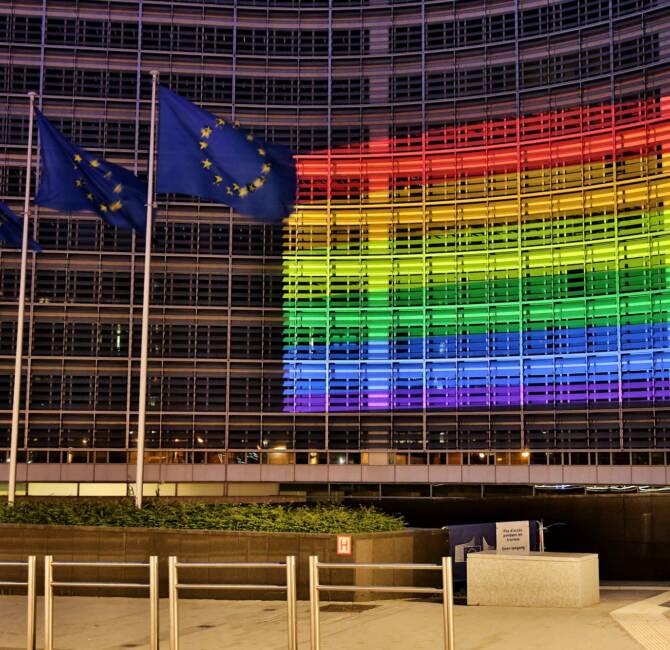By Raoul Weiss.
Romania – A preliminary warning is needed, which is valid for all elections organised in Romania. The counting of the votes is entrusted to a militarised secret service, the STS (the Special Transmissions Service), which employs a non-homologated software for this purpose. This dramatic lack of transparency (which, curiously enough, does not seem to disturb a lot of people in Washington DC or Brussels) is particularly worrying given the vertiginous gap created by the demographic and migratory erosion between the official electoral body (over 18 million official voters!) and the actual population eligible to vote. This enormous difference (rather difficult to estimate, definitely surpassing one million, going as far as 3-4 million), concretely making the STS (and the Romanian Deep State, generally) the de facto last instance referee in any electoral confrontation – close or even not very close. It is true, however, that the Deep State has other levers of (“upstream”) pressure over the Romanian political class, therefore it does not have to systematically activate this “nuclear option” from its anti-democratic arsenal.
Participation:
With one million voters missing as compared to the first round of the 2014 presidential elections, the participation shows – confirming our recent analysis – the incapacity of the Romanian political class of mobilising the electorate by the means of an obviously faked political offer, embodied by political non-personalities, chosen not by their talent or merits, but by their obedience towards the Deep State under international control.
The only exception might be the candidate of the Hungarian minority, Hunor Kelemen (4.13%), a brilliant and balanced intellectual, whose personal performance was appreciated by Romanian commentators across the political spectrum – including staunch nationalists such as Iulian Capsali, who claimed that Kelemen had only one major flaw in their eyes – namely being Hungarian. It’s also likely that a small part of his result– perfectly honourable for an ethnic minority candidate – is due to ethnically Romanian voters who were disgusted by the schemes of their ethnic kin in the context of the rather lamentable show organised by the Deep State under the name of “presidential elections”.
Let’s now analyse the results
(Former) populist camp
On this side, each of the components of the ruling coalition from the end of 2016 up to the summer of 2019 presented subpar candidates, given the purge by the Deep State of the charismatic personalities who made it initially successful.
Liviu Dragnea (PSD), imprisoned immediately after the European elections, and Călin Popescu Tăriceanu, whose ALDE party lost the support of European ALDE at about the same time (in a context involving, yet again, “judicial” threats); they were replaced respectively by:
- Viorica Dăncilă: a “yes-man” type MEP and without any political charisma until 2018, when she was called home by her countryman Liviu Dragnea (both of them being originally from the same county in SE Wallachia) to be proposed for the functions of PM; Dragnea needed a candidate who would be at the same time unable to stand up to him and able to be accepted by president Iohannis (meaning, implicitly: the SRI); her result on Sunday (23.45%, the worst result ever received by a PSD candidate at presidential elections), as well as the cheerful behaviour which could be easily observed in the headquarters of the National Liberal Party of Klaus Iohannis at the prospect of a Johannis – Dăncilă second round only ended up confirming the choice of Johannis (and of the SRI) in 2018; a doctrinal and communicational nullity, on her knees in front of the Deep State, Dăncilă is the perfect gravedigger of the PSD, capable of burying for good the biggest party in Romanian electoral history. The analysis of her electorate moreover confirms this prevision: the average Dăncilă voter is a peasant woman above the age of 60 who did not complete secondary education.
and
- Mircea Diaconu (9.17%), whose independent candidature was supported by an emasculated ALDE and by the mutineers who, lead by Victor Ponta, recently deserted the PSD (under the “Pro-România” label): a talented actor who ended up instead in politics, Diaconu, despite his genuine rhetorical talents and remarked patriotic rants, clearly hasn’t succeed in replacing the heavyweight Tăriceanu in politics; the radical (pro Dragnea) wing of ALDE definitely did not appreciate the (mis)alliance he concluded with Pro-România (as well as the opposite: for the “pro-European social-democrats” of Ponta, the political positions of Diaconu are likely to be all too “populist”).
Despite the parallelism of these two cases, the rules of the electoral battle explain that these equally mediocre results will not have the same consequences on the careers of the two candidates: Diaconu, what remains of ALDE and Pro România are at strong risk of remaining definitely ousted from politics, whereas Dăncilă is in the second round of the elections; even if she eventually loses, she can hope to keep leading the PSD and continue to further erode the party and to specialise it in the management of a backward and demographically doomed electorate, in particular by preventing the emergence of new and talented populist figures, comparable to Liviu Dragnea.
Globalist camp
- Although the beneficiary of a usual loyalist reflex and of the weakness of his competitors, Klaus Johannis barely improved his score (36.91% against 30.37% in the first round of 2014). The judicial-mediatic offensive launched in the last hundred meters against Dan Barna (caught up in “scandals”) by a state apparatus totally subservient to Johannis (and which also is in control of the government – de facto, and even officially for a month) has managed to repel part of the liberal-centrist electorate from the USR, but without bringing it closer to Klaus Johannis, whose record in power is non-existent, or at least unconvincing. The real purpose of this action was to reinforce the candidature of Dăncilă, given that a second round duel between the (anti-national) “right” and Dăncilă would allow Johannis’ team to replay the only tune they know: the mythical battle between the “champions of civilisation” and “the red plague”. In reality, this battle between the two halves (PNL/PSD) of the Atlanticist Janus Bifrons resembles more an internal arbitration within the Romanian (not very) “secret services” which, in two weeks, will be kind enough to invite the electorate to acknowledge (or even influence?) their choice.
- Despite optimistic (probably inflated) polls and a campaign which is said to have been very expensive, the big loser of this first round is Renew Europe’s local champion, Dan Barna (14.13%), who has now every chance to return in the short-term to the anonymity from where poorly-identified forces pulled him out – much like Obama – over the last year. It is anyway likely that the other two heavyweights (linked with deeper and more powerful networks) of the local Euro-globalist biosphere (Dacian Cioloș and Victor Ponta) let Barna try his fortune precisely because they sensed the fragility of his bet and the likelihood of his defeat. In any case, Cioloș was rather quick in saying his prayer over Barna’s political grave: on Sunday evening, immediately after the publication of the preliminary results, he announced his intention of breaking the collaboration between his movement (PLUS) and Barna’s USR. Therefore, the USR risks, in the worst case, to follow Barna in the tomb of aborted test-tube babies of the Romanian political show or, in the best case scenario, to remain a “back-up” force, easy to mobilise (especially in the streets of big cities) in the event of a general offensive against populism, while also kindly asked not to hope for more than a junior partner status in the family enterprise of comprador
Hybrids:
- With a result close to his campaign expectations, Teodor Paleologu (5.7%), a living contradiction, creates a zone of uncertainty in the landscape of the second round. It is hard not to notice the enormous contrast between the personality of the candidate – a refined intellectual, deemed to be an honest person, the son of an illustrious family of the Romanian aristocracy – and the party which supported his candidacy, the PMP, an ad-hoc creation for the political survival of the Romanian Saakashvili: Traian Băsescu, a divisive figure (notable because of his foul speech, often aggravated by his alcoholic habits), now irrefutably proven to have been (under the codename Petrov) a collaborator of the infamous Securitate. Unfortunately enough, this contradiction is not limited to a simple divergence of style between a “godfather” and his “godson”, but penetrates Paleologu’s own discourse: on one hand, he calls himself a “conservative” (and his electorate may have wanted to punish Johannis for his numerous concessions to the Euro-Atlantic LGBT lobby), while, on the other hand, spending a lot of time in talk-shows talking about the “Putinist threat” (albeit his intellectual Russophilia is well-known) and the “Orbán danger”. But the most intriguing question is, of course: how will his electorate behave in the second round, insofar as the latter could, theoretically, constitute an arbitration minority between Johannis and Dăncilă; if a shift of this fundamentally anti-communist electorate towards a PSD candidate seems impossible, their shift to Johannis – whether asked for or not by Paleologu himself – is all but easy, considering that many members of this cohort, also signatories of the petition for a referendum on the family, probably remember to have been called “religious fanatics” by Klaus Johannis, who does not try a lot to conceal his fierce anticlericalism.
- Likely to be, like his political ally Viktor Orbán in Hungary, already more popular than his own party (the UDMR/RDMSZ – the main party of the Hungarian minority), Hunor Kelemen collaborated until last summer (albeit outside the government) with the populist coalition created by Liviu Dragnea and the government supported by the latter under the leadership (for the lack of an alternative) of Viorica Dăncilă. However, he was forced to move away from this cooperation as a result of a crescendo of Magyarophobic provocations organised by the Deep State, which the Dăncilă government proved unable (or unwilling) to oppose. However, considering that Johannis is just as Magyarophobic, or even more so, and his hostility to Budapest and FIDESZ as open as it can get, an alliance with the PNL is at least as unnatural (if not more unnatural) than the one with the PSD, meaning that the UDMR will probably return to the tactics of pragmatic bargaining; this attitude, while admittedly seldom leading to grand achievements, managed to secure the survival of the party under the leadership of its founding father (as well as predecessor and mentor of Kelemen), Béla Markó, by functioning as a minor, but often indispensable component to various governmental coalitions in order to get as many concessions as possible for the Hungarian minority from the – often willingly paranoid and chauvinistic – ethnic majority.
Conclusions
- Combined with the failure of the Ponta/Diaconu start-up, the defeat of Dan Barna’s USR marks a decline of Euroglobalist forces in Romania, a country which remains dominated by Atlanticist forces (meaning: PSD “on the left” and PNL “on the right”).
- Realised in the context of the liquidation of the populist movement of the 2016-2019 period, this reset remains, however, covered on the surface by a purely verbal clash between the “right” (PNL, USR, and PMP) and the “left” (PSD, Pro-România and practically ALDE –though the latter is theoretically on the right) – while both “sides” are characterised by their total submission to the Deep State and big international capital. This is bad news for the populists of Central Europe who (with the exception of Poland, due to its ambiguous positioning) will, for quite a few years, have to endure a geopolitical enemy on their south-eastern flank.
- Overall, we witness a return to the pre-December 2016 political landscape. Except that the populist experience of the 2016-2019 period, although abruptly aborted, has left some marks: declining participation numbers suggest that fewer and fewer Romanians are fooled by the pseudo-democratic show staged by the Deep State. Furthermore, since the upcoming victory of Johannis is likely to prolong the mandate of a visibly incapable Ludovic Orban as head of cabinet, it will likely lead to the rapid decline of the socio-economic conditions of the country. Such a turn of events might, hopefully, remind the most idealistic voters of the very tangible merits of “odious populist” Dragnea, who, “corrupt” as he may have been, managed to achieve the most spectacular leap forward since 1990 in terms of standards of living. Thus, to be continued!




